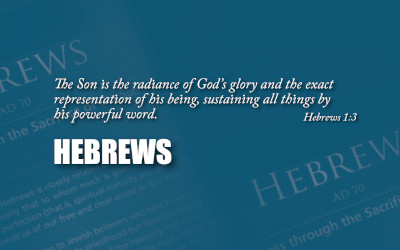Hebrews 5:1-14
A different priest. Jesus’ obedience through suffering. Our obedience. Milk vs. solid food - Old vs. New Covenant.
(Bấm vào đây để đọc tiếng Việt)
 "1For every high priest is taken from among the people and appointed to represent them before God, to offer both gifts and sacrifices for sins. 2He is able to deal compassionately with those who are ignorant and erring, since he also is subject to weakness, 3and for this reason he is obligated to make sin offerings for himself as well as for the people. 4And no one assumes this honor on his own initiative, but only when called to it by God, as in fact Aaron was. 5So also Christ did not glorify himself in becoming high priest, but the one who glorified him was God, who said to him, “You are my Son! Today I have fathered you,” 6as also in another place God says, “You are a priest forever in the order of Melchizedek.” 7During his earthly life Christ offered both requests and supplications, with loud cries and tears, to the one who was able to save him from death and he was heard because of his devotion. 8Although he was a son, he learned obedience through the things he suffered. 9And by being perfected in this way, he became the source of eternal salvation to all who obey him, 10and he was designated by God as high priest in the order of Melchizedek.
"1For every high priest is taken from among the people and appointed to represent them before God, to offer both gifts and sacrifices for sins. 2He is able to deal compassionately with those who are ignorant and erring, since he also is subject to weakness, 3and for this reason he is obligated to make sin offerings for himself as well as for the people. 4And no one assumes this honor on his own initiative, but only when called to it by God, as in fact Aaron was. 5So also Christ did not glorify himself in becoming high priest, but the one who glorified him was God, who said to him, “You are my Son! Today I have fathered you,” 6as also in another place God says, “You are a priest forever in the order of Melchizedek.” 7During his earthly life Christ offered both requests and supplications, with loud cries and tears, to the one who was able to save him from death and he was heard because of his devotion. 8Although he was a son, he learned obedience through the things he suffered. 9And by being perfected in this way, he became the source of eternal salvation to all who obey him, 10and he was designated by God as high priest in the order of Melchizedek.
WARNING AGAINST APOSTASY
11On this topic we have much to say and it is difficult to explain, since you have become sluggish in hearing. 12For though you should in fact be teachers by this time, you need someone to teach you the beginning elements of God’s utterances. You have gone back to needing milk, not solid food. 13For everyone who lives on milk is inexperienced in the message of righteousness, because he is an infant. 14But solid food is for the mature, whose perceptions are trained by practice to discern both good and evil. (Hebrews 5:1-14)
A DIFFERENT PRIEST
“6as also in another place God says, “You are a priest forever in the order of Melchizedek.”” (Hebrews 5:6)
The Levitical priesthood was a hereditary priesthood established in ancient Israel, specifically among the tribe of Levi, one of the twelve tribes of Israel. The high priest, often from the family of Aaron, held a significant position within the Levitical priesthood. He had special responsibilities, including entering the Holy of Holies in the Tabernacle or Temple once a year to make atonement for the sins of the people.
Nevertheless, the priesthood of Jesus Christ stands apart. God proclaims regarding Him: “You are a priest forever in the order of Melchizedek.” This is a priesthood that knows no commencement or conclusion, where the supreme high priest offers Himself as a sacrifice without the need for sin offerings on His behalf because He is the flawless Lamb of God, entirely without sin.
JESUS’ OBEDIENCE THROUGH SUFFERING
“8Although he was a son, he learned obedience through the things he suffered.” (Hebrews 5:8)
In everything that Jesus accomplishes, He acts on our behalf. He does so in His capacity as both God and fully human, and He does so flawlessly. Because Jesus is devoid of a sinful nature, He is not bound by the law, which means His obedience differs from that of fallen humanity. His most significant act of obedience is to endure the cross for the redemption of mankind’s sins.
OUR OBEDIENCE
“9And by being perfected in this way, he became the source of eternal salvation to all who obey him,” (Hebrews 5:9)
So, how can we obey Jesus in order to attain “eternal salvation”? As discussed earlier in chapter 4, we understand that the obedience sought by God from the Israelites is their faithful obedience to the testimony of Joshua and Caleb regarding the bountiful nature of the Promised Land, filled with milk and honey, waiting to welcome them.
Hence, our obedience today is centered on belief, on placing our trust in what Jesus accomplished on the cross for us. While Jesus’s obedience involved offering Himself on the cross, our obedience entails accepting this priceless gift of life by “faithfully listening” to God’s message of salvation (Hebrews 4:2).
MILK vs. SOLID FOOD - OLD vs. NEW COVENANT
“12For though you should in fact be teachers by this time, you need someone to teach you the beginning elements of God’s utterances. You have gone back to needing milk, not solid food. 13For everyone who lives on milk is inexperienced in the message of righteousness, because he is an infant. 14But solid food is for the mature, whose perceptions are trained by practice to discern both good and evil.” (Hebrews 5:12-14)
Many Christians often possess a limited understanding of the distinction between “milk” and “solid food” in this passage. Perhaps verse 13 may shed light on the meaning of “milk”, as it states: “For everyone who lives on milk is inexperienced in the message of righteousness.” Notably, Paul’s epistles primarily focus on conveying the message of righteousness.
Therefore, individuals who lack familiarity with the message of righteousness may struggle to grasp how to attain God’s righteousness. A central theme in Paul’s writings is the juxtaposition of righteousness achieved through obedience to the law and righteousness obtained through faith.
Considering the context of Paul’s writing, it becomes evident that those who are guided by the law as their tutor are nourished with milk, whereas those who rely on faith in Christ for righteousness are truly partaking of solid food.
Consequently, those who continue to partake of milk are still dwelling within the confines of the Old Covenant, whereas those who consume solid food have made a complete transition to the New Covenant. In this context, discerning “good and evil” also entails the ability to distinguish the various methods for achieving God’s righteousness: works of the law or faith in Christ.
Nghi Nguyen
- Scripture quoted by permission. All scripture quotations, unless otherwise indicated, are taken from the NET Bible® copyright ©1996-2006 by Biblical Studies Press, L.L.C. All rights reserved.
Disclaimer: This is my own opinion on the topic, which does not necessarily reflect the church's theology, or beliefs of the individuals in it — Nghi Nguyen
